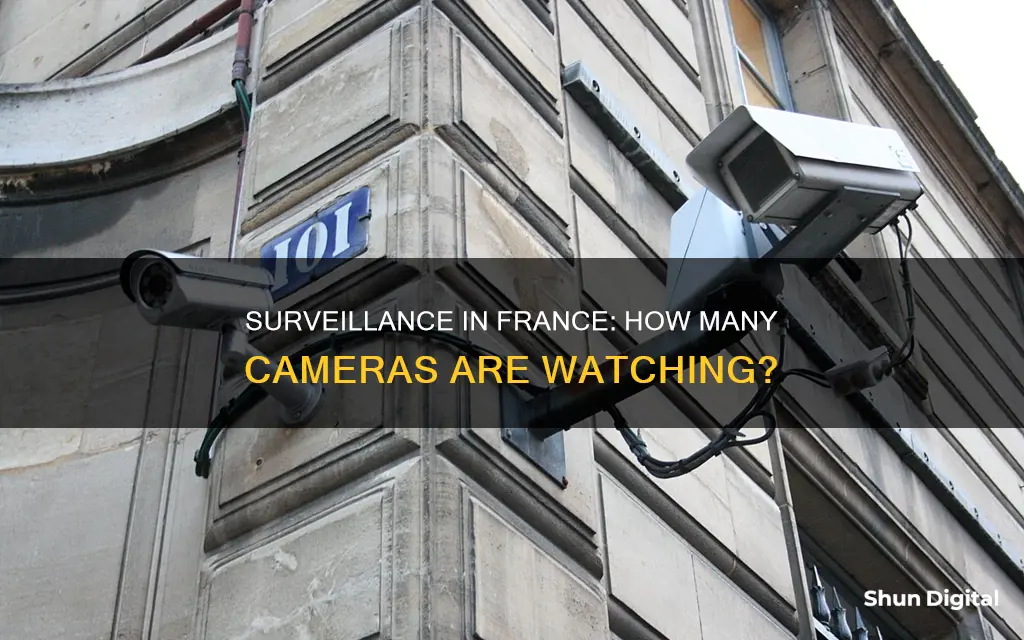
France has a long history of surveillance, dating back to the early 1800s when Napoleon Bonaparte revived the Paris Police Prefecture and tasked them with monitoring political opponents. In the 1880s, Alphonse Bertillon, who worked for the Paris Police Prefecture, introduced a method of identifying suspects and criminals using biometric features, which became the forerunner of facial recognition technology. Today, France has a sophisticated surveillance apparatus, including the ability to intercept private communications, store fingerprints, and monitor most of the country with cameras. In 2020, there were approximately 90,000 video surveillance cameras operated by the police and gendarmerie, and this number is expected to increase with the deployment of large-scale, real-time, algorithm-supported video surveillance cameras for the 2024 Paris Olympics.
| Characteristics | Values |
|---|---|
| Number of surveillance cameras in France | 90,000 (2020) |
| Number of surveillance cameras in Paris | 6,500 (planned) |
| Number of authorized cameras in France | 340,000 |
| Year France relaxed its laws governing public space surveillance | 1995 |
| Number of cities in France that received approval for CCTV installation in high-risk locations between 1997 and 1999 | 200+ |
What You'll Learn
- France's surveillance state will be on full display at the 2024 Paris Olympics
- The country's surveillance history dates back to Napoleon Bonaparte
- French public opinion initially pushed back against the use of technology to monitor citizens
- France relaxed its laws governing public space surveillance through the Pasqua Law in 1995
- The number of authorized cameras in France was about 340,000 in 2007

France's surveillance state will be on full display at the 2024 Paris Olympics
France's surveillance state has a long history, dating back to the early 1800s and Napoléon Bonaparte. Over the past two centuries, the country has developed a sophisticated surveillance system, including the ability to intercept private communications, store data, and monitor its territory with cameras. This system, which has faced criticism from digital rights organizations and UN experts, will be on full display at the 2024 Paris Olympics.
In July 2024, France will deploy large-scale, real-time, algorithm-supported video surveillance cameras for the first time in Europe. This move comes as part of the country's efforts to strengthen its video surveillance system, which was relatively undeveloped compared to other countries in the wake of the 2005 London transport attacks. At the time, there were about 340,000 authorized cameras in France, according to an official report.
The use of advanced surveillance technology at the Olympics is not an isolated incident. France has a long history of surveillance, with each new interior minister pushing for reforms and expanding the country's security apparatus. The country's surveillance state has been influenced by a strong centralized state, powerful law enforcement, and a political focus on law and order, especially in the wake of terrorist attacks in the 2010s.
While the deployment of algorithmic video surveillance cameras has been justified as a necessary tool to fight terrorism and crime, it has also raised concerns about civil liberties and privacy infringement. Critics argue that France is morphing into a dystopian society, with a recent report stating that French legislation is not compliant with the European Court of Human Rights' case law on intelligence-sharing between domestic and foreign agencies.
The 2024 Paris Olympics will provide a global showcase for France's surveillance industry, which generated €1.6 billion in 2020. Companies specializing in biometrics and identification, such as Thalès, Safran, and Idemia, stand to benefit from the increased attention and potential for new contracts. The Olympics will also be a testing ground for AI-powered surveillance technology, with French lawmakers arguing that encouraging the development of domestic and European solutions is crucial to maintaining sovereignty and avoiding dependence on foreign software.
Olympus Camera Battery: How Long Does It Last?
You may want to see also

The country's surveillance history dates back to Napoleon Bonaparte
Napoleon, who was born in 1769 on the island of Corsica, rose to power during the French Revolution. He led a series of successful campaigns across Europe during the French Revolutionary and Napoleonic Wars from 1796 to 1815. He was the leader of the French Republic as First Consul from 1799 to 1804 and then became Emperor of the French from 1804 to 1814, with a brief return to power in 1815.
Napoleon's regime was marked by a strong centralized state and a powerful law enforcement community. He revived the Paris Police Prefecture, which still exists today, and tasked law enforcement with new powers to monitor and control political opponents. According to Jean Paul Bertaud, a specialist on the French Revolution, "Everywhere there are spies of the police. Everyone listens to what you say. It's impossible to express yourself unless Napoleon wants you to."
During Napoleon's rule, the police kept extensive records and files on citizens. In the 1880s, Alphonse Bertillon, who worked for the Paris Police Prefecture, introduced a new method of identifying suspects and criminals using biometric features. This became the forerunner of facial recognition technology.
Napoleon's focus on surveillance and control extended beyond France's borders. He led military campaigns across Europe, invading Egypt, Syria, the Ottoman Empire, and Russia. He also established the Confederation of the Rhine, a collection of German states that served as a buffer zone between France and Central Europe.
Napoleon's legacy in France and Europe is complex. He enacted modernizing legal and administrative reforms, established a system of public education, abolished feudalism, and centralized state power. However, he is also known for his controversial decisions, such as reinstating slavery in colonies, reducing civil rights for women and children, and engaging in wars that devastated Europe.
The country's long history of surveillance, which began with Napoleon, has continued to evolve over the centuries. In the 20th and 21st centuries, the development of new technologies, such as computers and video surveillance cameras, has provided new tools for surveillance and data collection. While these technologies can be used to enhance security, they also raise concerns about civil liberties and privacy.
Today, France has a sophisticated surveillance apparatus, including the ability to intercept private communications, store fingerprints, and monitor territories with cameras. As the country prepares to host the 2024 Summer Olympics in Paris, its surveillance state will be on full display, with the deployment of large-scale, real-time, algorithm-supported video surveillance cameras.
Privacy Mode on D-Link Cameras: What You Need to Know
You may want to see also

French public opinion initially pushed back against the use of technology to monitor citizens
In the 1970s, French public opinion initially pushed back against the use of technology to monitor citizens. In 1974, as ministries began using computers, the newspaper Le Monde revealed a plan to merge all citizens' files into a single computerized database, known as Project SAFARI. The resulting scandal caused the project to be abandoned, and it prompted lawmakers to adopt robust data protection legislation, establishing France's privacy regulator, CNIL. As a result, France became one of the few European countries with rules in place to protect civil liberties in the computer age.
However, the tide began to turn in the 1990s with the mass spread of technology, and more specifically, video surveillance cameras. Politicians and local officials made alluring promises of security in exchange for surveillance technology. The terrorist attacks of the 2010s further accelerated this trend, with lawmakers increasingly focused on law and order. In the name of national security, they granted intelligence services and law enforcement unprecedented powers to monitor citizens with limited judicial oversight.
The rise of tech giants such as Google, Facebook, and Apple has also played a role in shaping public opinion. Policymakers have argued that if citizens give their data to these companies, they should also allow the state to gather personal information for security purposes. This shift in public opinion has been reflected in the legislative push for more state surveillance, despite resistance from privacy activists and digital rights organizations.
The 2024 Paris Summer Olympics will be a showcase for France's surveillance state, with the deployment of large-scale, real-time, algorithm-supported video surveillance cameras. While this has been controversial, with critics pointing to the potential infringement of civil liberties, supporters argue that such measures are necessary to fight terrorism and crime. The French government maintains that these measures are crucial for ensuring security during the Olympic Games and that they do not infringe upon privacy rights.
Surveillance Cameras: Landlords' Legal Obligation to Inform Tenants
You may want to see also

France relaxed its laws governing public space surveillance through the Pasqua Law in 1995
France has a long history of surveillance, dating back to the early 1800s under Napoléon Bonaparte. Over the years, the country has developed a surveillance apparatus that includes intercepting private communications, retaining traffic and localisation data, storing fingerprints, and monitoring most of its territory with cameras.
In 1995, France relaxed its laws governing public space surveillance through the Pasqua Law. Charles Pasqua, the French Interior Minister at the time, was known for his hardline stance on immigration. The Pasqua Laws, as they came to be known, were introduced with the goal of achieving "zero immigration." These laws included a series of anti-immigration measures that restricted the rights of foreigners and made it more difficult for them to acquire French nationality.
The Pasqua Laws tightened the regulations around family reunification, making it harder for legal immigrants to bring their family members into the country. They ended the automatic issuance of 10-year work permits to children of legal immigrants when they turned 18. The laws also prohibited the granting of French nationality to an illegal resident who married a French citizen and made it more challenging for foreign students to acquire long-term residency. Additionally, the laws enhanced the powers of the police to deport foreigners and restricted the right to appeal asylum rejections.
The impact of the Pasqua Laws was significant, leading to a continuous decline in permanent entries into France from 1995 to 1997, with the lowest levels of immigration since World War II. The laws were not without controversy, as they were criticised by the political left and immigrants' rights groups, who argued that they were dangerous for the country's long-term domestic peace and destabilising for legal immigrants.
While the Pasqua Laws represented a relaxation of surveillance laws in public spaces, they also contributed to a growing sense of surveillance and control over the lives of foreigners in France. The combination of these laws with the increasing prevalence of video surveillance cameras in the 1990s marked a shift towards a more monitored society.
Charging Your Roku Doorbell Camera: A Step-by-Step Guide
You may want to see also

The number of authorized cameras in France was about 340,000 in 2007
In response to the growing concerns of terrorism and street crime, France announced plans to strengthen its video surveillance system by tripling the number of cameras by 2009. This decision was influenced by the successful prevention of attacks in London through the use of their more advanced surveillance system, which was 10 times more developed than France's at the time.
The expansion of video surveillance in France has been a gradual process. The Pasqua Law of 1995 relaxed restrictions on public space surveillance, leading to a rapid increase in CCTV installations in high-risk locations. By 2003, France had already authorized the use of CCTV in more than 200 cities.
The use of video surveillance in France is governed by specific regulations that individuals and businesses must comply with. For example, cameras can only capture footage of the interior of a property and its immediate surroundings, and the dissemination of collected data through the internet or social media is prohibited.
The installation of surveillance cameras in France is often considered a solution to fight the sense of insecurity felt by many French people. While there is support for these installations, the collection of personal data is more divisive.
Mastering Camera Focus for Creative Forced Perspective Shots
You may want to see also
Frequently asked questions
In 2020, there were about 90,000 video surveillance cameras in France that were powered by the police and the gendarmerie.
In 2007, France planned to increase its number of surveillance cameras from 340,000 to 1 million by 2009. In 2019, London was reported to have 127,423 cameras. In comparison, Berlin had 11.2 cameras per 1,000 inhabitants, Vienna had 7.4, and Paris had 3.1.
In 2021, the majority of French respondents were in favor of installing surveillance cameras. However, the collection of personal data was more divisive.
France has strict laws and regulations surrounding the use of surveillance cameras. For example, cameras can only be directed towards the interior of a property and its immediate surroundings. Additionally, signs must be posted to inform individuals of the presence of cameras, and images collected may not be disseminated online or on social media.







